#Magento 2 Connector for NetSuite
Explore tagged Tumblr posts
Text
#magento netsuite connector#magento 2 netsuite connector#magento netsuite integration#magento connector netsuite integration#magento netsuite erp integration#netsuite magento 2 integration#magento 2 netsuite integration
0 notes
Text
How Celigo iPaaS Streamlines Business Connectivity?

Integrating different business systems can be complex, but with Celigo iPaaS (Integration Platform as a Service), it doesn’t have to be. Celigo offers an intuitive platform that allows even non-technical users to easily connect tools like Oracle NetSuite, CRMs, and e-commerce platforms. No coding required! With Celigo, businesses can streamline their processes, automate data flows, and ensure all systems are in sync—saving time and boosting efficiency.
Time and Cost Savings: The Efficiency Gains with Celigo iPaaS
Celigo iPaaS offers significant time and cost savings by automating repetitive tasks and reducing manual intervention in data transfers. Its drag-and-drop interface minimizes development time, allowing businesses to set up integrations without needing specialized programming expertise. This not only accelerates project timelines but also cuts down on labor costs. The platform’s ability to handle complex workflows and large data volumes efficiently also ensures that businesses can focus on scaling their operations without worrying about integration bottlenecks.
Pre-built Connectors: Accelerating Integration with Celigo Marketplace
Celigo’s Marketplace offers a wide array of pre-built connectors, covering popular applications such as Salesforce, Oracle NetSuite, Shopify, Magento, SAP, Google Workspace. These pre-built connectors help businesses jump-start their integrations, removing the need for custom development from scratch. With access to these connectors, companies can quickly connect their systems and leverage out-of-the-box automation solutions tailored to their needs. This not only speeds up implementation but also ensures that integration efforts are based on best practices already embedded in these pre-built solutions.
Flexible Data Mapping: Achieving Seamless Data Transfer with Celigo
One of the key benefits of Celigo iPaaS is its flexible data mapping capabilities. This allows businesses to customize how data is transferred between systems, ensuring that information flows smoothly and accurately, regardless of system-specific data formats. With Celigo’s user-friendly interface, users can create custom data transformations and map fields across applications without needing advanced technical skills. This flexibility reduces errors in data transfers, ensuring that the right data reaches the right place at the right time.
Real-Time Data Processing: The Advantage of Event-Driven Integrations
Celigo iPaaS supports real-time, event-driven integrations, allowing businesses to process data as soon as an event occurs in any connected system. This is crucial for industries where immediate data availability can impact decision-making, such as e-commerce, finance, and supply chain management. By enabling real-time data processing, Celigo ensures that business operations stay updated, helping companies respond quickly to changes, whether it’s processing an online order or updating inventory levels in real-time.
Security Assurance: Certifications and Measures in Celigo iPaaS
Security is a top priority for any integration platform, and Celigo meets this need by providing robust security features, including encryption, data masking, and role-based access controls. The platform is compliant with major industry standards, such as GDPR, SOC 2, and HIPAA, ensuring that sensitive business data is protected at all times. By leveraging secure APIs and certified connectors, businesses can trust that their data is being transmitted and stored securely across integrated applications.
Scalability with Confidence: How Celigo Supports Growing Integration Needs
As businesses grow, so do their integration needs. Celigo iPaaS is built to scale with businesses, offering the flexibility to handle increasing data volumes, complex workflows, and expanding systems. The platform’s cloud-based architecture ensures that it can accommodate new applications and processes without compromising performance. Celigo’s scalability also extends to its pricing model, allowing companies to pay for what they need and scale up as their integration demands increase, offering long-term value as organizations evolve.
Error Handling Best Practices: Minimizing Disruptions in Integrations
Errors in data transfers and integrations can cause major disruptions in business processes. Celigo iPaaS offers built-in error-handling mechanisms that allow businesses to identify and resolve issues before they escalate. The platform provides real-time error notifications and detailed logs, giving users the ability to troubleshoot and correct errors swiftly. Additionally, Celigo’s automated retry mechanisms ensure that temporary issues, such as network outages, do not halt integrations indefinitely, minimizing downtime and keeping operations running smoothly.
Custom Connector Development: Extending Functionality with Celigo iPaaS
While Celigo offers a rich library of pre-built connectors, it also allows businesses to create custom connectors tailored to their unique needs. With Celigo’s custom connector development tools, businesses can integrate with niche applications or internal systems that may not have existing connectors in the marketplace. This feature extends Celigo’s flexibility, ensuring that businesses can connect all their critical systems, regardless of whether they are mainstream or proprietary. Custom connectors can be developed by in-house teams or with the help of Celigo’s professional services, providing a path to unlimited integration possibilities.
Choose Integs Cloud
For more information on how Celigo iPaaS can transform your business through seamless integrations, contact Integs Cloud. Our team of experts is ready to help you streamline operations and boost efficiency with tailored Celigo solutions. Let’s connect and explore how we can simplify your integration needs! Contact Us Now!
#Celigo#IntegsCloud#BusinessAutomation#Integration#CeligoPartner#CeligoServicePartner#Efficiency#Productivity#SaveTime#WorkflowOptimization#BusinessGrowth#DigitalTransformation#iPaaS#CloudIntegration#Automation#EnterpriseTech
0 notes
Text
What is NetSuite Integration & How Does it Work?
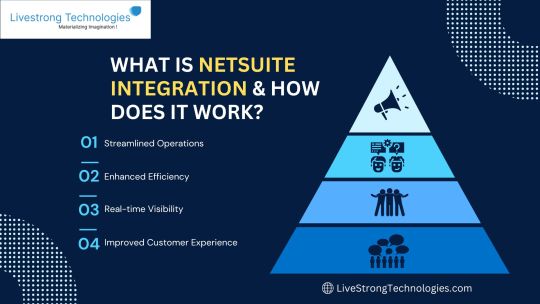
In the ever-evolving landscape of business technology, integration has become a cornerstone for organizations seeking to streamline operations, enhance efficiency, and drive growth. NetSuite, a leading cloud-based enterprise resource planning (ERP) solution, offers robust integration capabilities to connect disparate systems and processes seamlessly. Understanding what NetSuite integration is and how it works is essential for businesses aiming to harness the full potential of their technology stack.
What is NetSuite Integration?
NetSuite integration refers to the process of connecting NetSuite's ERP platform with other third-party applications, systems, or data sources to facilitate data exchange and workflow automation. This integration enables businesses to centralize their operations, eliminate data silos, and achieve real-time visibility into critical business functions such as finance, inventory management, customer relationship management (CRM), e-commerce, and more.
How Does NetSuite Integration Work?
NetSuite offers various integration options, each tailored to suit different business needs and technical requirements. Here's a breakdown of how NetSuite integration typically works:
1. SuiteTalk (Web Services): SuiteTalk is NetSuite's web services integration platform, which allows developers to build custom integrations between NetSuite and external systems using industry-standard protocols such as SOAP (Simple Object Access Protocol) and REST (Representational State Transfer). This method provides bi-directional communication capabilities, enabling seamless data synchronization between NetSuite and other applications.
2. SuiteScript: SuiteScript is NetSuite's built-in JavaScript-based scripting language that empowers developers to customize and extend the functionality of NetSuite applications. By leveraging SuiteScript, businesses can develop custom integration solutions tailored to their specific requirements. SuiteScript supports both synchronous and asynchronous integration methods, enabling real-time data processing and automation.
3. SuiteTalk (RESTlets): RESTlets are custom REST (Representational State Transfer) endpoints that allow developers to create lightweight integrations between NetSuite and external systems using RESTful APIs (Application Programming Interfaces). RESTlets provide a flexible and scalable approach to integration, enabling seamless communication between NetSuite and third-party applications over the web.
4. NetSuite Integration Platform (NSIP): NetSuite Integration Platform is a comprehensive solution that simplifies and accelerates the integration process by providing pre-built connectors, data mapping tools, and workflow automation capabilities. NSIP offers out-of-the-box integration with popular third-party applications such as Salesforce, Magento, Shopify, and more, allowing businesses to streamline their operations without extensive development efforts.
Benefits of NetSuite Integration:
- Streamlined Operations: NetSuite integration enables businesses to centralize their operations and eliminate manual data entry by automating workflows and data synchronization processes.
- Enhanced Efficiency: By integrating NetSuite with other systems and applications, businesses can streamline processes, reduce errors, and improve productivity across the organization.
- Real-time Visibility: NetSuite integration provides real-time visibility into critical business data, enabling informed decision-making and proactive management of key processes.
- Scalability: NetSuite's flexible integration capabilities allow businesses to scale their operations seamlessly as they grow, without compromising performance or efficiency.
- Improved Customer Experience: By integrating NetSuite with CRM, e-commerce, and customer support systems, businesses can deliver a seamless and personalized experience to their customers, driving satisfaction and loyalty.
NetSuite integration plays a pivotal role in enabling businesses to unlock the full potential of their ERP system by connecting it with other critical systems and applications. Whether through custom development, pre-built connectors, or third-party solutions, businesses can leverage NetSuite integration to streamline operations, enhance efficiency, and drive growth in today's competitive business landscape.
0 notes
Photo

Since arrangement suppliers enhanced netsuite magento 2 for the Internet, clients will get the best in web based business encounter.
Hence, this advantage is a fundamental conveyance from NetSuite to organizations of any size. Nonetheless, Magento and NetSuite are two frameworks with various administrations and gatherings of people. In this way, on the off chance that you are endeavoring to utilize the two stages, you will dawdle and create a ton of missteps. It is superfluous for organizations to keep returning and-forward between the frameworks to get work achieved.
Ideally, this bodes well why organizations require the two stages. Obviously expressed, Magento and NetSuite mix enables retailers to join the powerful Magento 2 internet business program with NetSuite ERP's back office highlights. Likewise, client requests are satisfied through the Magento Commerce stage front-end framework. This arrangement works with a brought together cloud-based request controller by magento 2 netsuite api .
#netsuite magento 2#magento 2 netsuite api#netsuite magento 2 integration#Magento 2 Connector for NetSuite
6 notes
·
View notes
Text
Three Approaches to Integrate Magento with NetSuite
Several businesses these days remain in the market due to their ability to automate various processes. They believe that investing in practical integrations is the way forward and a great way to sustain the business. In this blog, we will talk about NetSuite Magento Integration and the different approaches used to integrate Magento with NetSuite.

As a Magento 2 migration service company, we believe in making sure that your eCommerce business runs efficiently. Therefore, from magento speed optimization to integrations, we make sure you get the full package to grow commercially.
Three Approaches to Integrate Magento with NetSuite
Integrating Magento and NetSuite offers three main options, each with its advantages and considerations. Let's delve into these three options in detail to get an idea of what option may suit your operations and requirements.
Option 1: SaaS-based Integration Platform
This cloud-based platform facilitates data movement between the two systems. Ideally, the platform provides pre-built connectors for Magento and NetSuite, as well as other platforms for future integrations. These pre-built connectors offer out-of-the-box functionality for faster implementation. Unlike point-to-point solutions, these connectors are often configurable, allowing customization to accommodate specific business needs. Sellers can define rules for data flow, granting more control over how data moves between systems.
Merchants can expect to pay a monthly subscription fee for access to the software, an implementation fee for connector configuration, and ongoing maintenance of the integration and connectors.
Option 2: Point-to-Point Integration
Point-to-point integration involves using vendor-provided solutions available in the Magento Extension Marketplace. This approach synchronizes data between Magento and NetSuite by directly connecting the systems. Data such as inventory counts, orders, customers, and items can be synchronized between the two platforms.
However, point-to-point integration poses challenges for expanding retailers. Adding new sales channels or management systems becomes cumbersome as each new connection requires multiple additional integrations. If one connection fails, the entire system may fail.
This integration setup necessitates a complete rebuild of operations as your business grows, consuming more resources and creating complexity.
Option 3: Custom Magento to NetSuite Integration
Some sellers opt for custom integration, building their solution by leveraging the available APIs of Magento and NetSuite. This approach involves writing custom code to directly connect and synchronize the systems. Custom integration projects are typically handled in-house or by third-party vendors such as eCommerce agencies or ERP consultants.
Custom integration demands in-depth knowledge of both Magento and NetSuite to understand how each system accepts and exchanges data, ensuring compatibility. It is not suitable for individuals learning on the job.
Custom integration may be necessary for businesses with unique requirements, such as complex SKU management or customized order fulfillment logic. In such cases, writing a custom solution becomes the only option.
However, for most sellers, including B2B operations, the cost and maintenance of custom integration outweigh the benefits. Many find alternative approaches to be easier and more cost-effective in the long run.
In conclusion, selecting the right integration option for Magento and NetSuite depends on factors such as budget, scalability, customization needs, and long-term maintenance, among other aspects.
0 notes
Photo
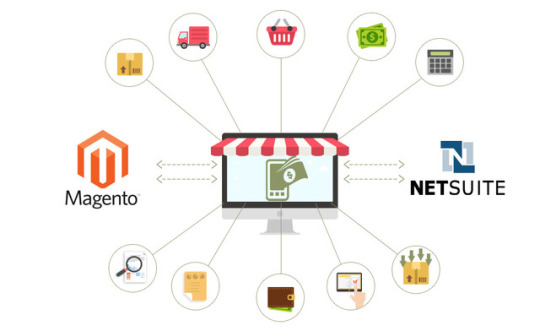
Magento 2 Connector for NetSuite Our solution provide a real time connector between NetSuite integration and Magento via API. All sales order data, customer data and Inventory stock stay up to date with minimum monitoring from admin.
5 notes
·
View notes
Text
Evrig is a trusted Magento integration agency offering expert Magento 2 Integration Services to seamlessly connect your e-commerce store with third-party platforms. Boost efficiency, improve customer experience, and grow your business. Contact us today!
#magento integration agency#Magento 2 Integration Services#Magento Hyva Theme Integration#Hyva Theme Integration#Hyva Theme integration services#aem ecommerce integration#magento netsuite integration#magento connector netsuite integration
0 notes
Text
Why Choose Celigo Integrator.Io Over Building Custom API Integration?
In the world of data integration, the debate between using a platform like Celigo integrator.io vs building a custom API integration is a hot topic. This article aims to shed light on why Celigo might be a better choice for your business.
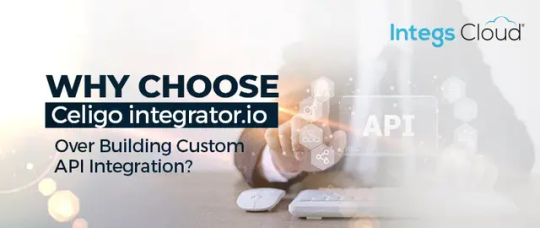
What Is Celigo Integrator.Io?
Celigo integrator.io is a leading iPaaS (Integration Platform as a Service) platform that allows businesses to connect their applications and automate business processes. With its robust iPaaS platform, businesses can seamlessly connect their systems such as Oracle NetSuite, Salesforce, Amazon, Shopify, BigCommerce, 3PL Systems and similar other applications.
Celigo Integrator.Io Vs Custom API Integration
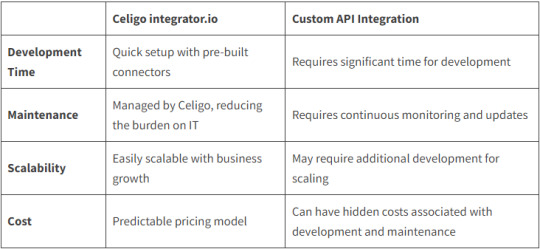
Key Advantages Of Celigo Integrator.Io
Pre-built Connectors: Celigo offers pre-built connectors for integration use cases like Oracle NetSuite ERP integration with Shopify, Amazon, BigCommerce, Salesforce, Magento 2, etc., which significantly reduces the time and effort required to set up integrations.
Scalability: As your business grows, so does your data. Celigo, integrator.io ensuring your integrations can handle increased data volume.
Reduced IT Burden: With Celigo integrator.io, the burden on IT teams is significantly reduced as the platform manages the integrations, freeing up resources for other tasks.
Cost-Effective: Unlike Custom API Integrations, which can have hidden costs associated with development and maintenance, Celigo offers a predictable pricing model.
In conclusion, Custom API integration development offers flexibility, however on the other side, the quick setup, scalability, reduced IT burden, and cost-effectiveness of Celigo make it a compelling choice for businesses looking to streamline their processes with efficient integrations. The Celigo integrator.io is a testament to the platform’s capabilities and effectiveness.
Integs Cloud: Your Trusted Celigo Integration Partner
Integs Cloud is a certified Celigo partner that provides end-to-end integration services, from consulting and implementation to support and maintenance. With a team of experienced and certified Celigo experts, Integs Cloud can handle any integration challenge and deliver solutions that meet your business needs and goals.Whether you need to integrate Oracle NetSuite with Shopify, Amazon, BigCommerce, Salesforce, Magento 2 or any other applications, Integs Cloud can help you achieve it with the Celigo iPaaS platform. Contact Integs Cloud today and get a free consultation and quote for your integration project.
#IntegsCloud#DataIntegration#DataAutomation#Celigo#CeligoVsCustomAPI#IntegrationSolutions#APIIntegration#DataFlow#iPaaS#Integration#Automation#API#SaaS#Enterprise#Tech#Technology#ERP#Software
0 notes
Photo
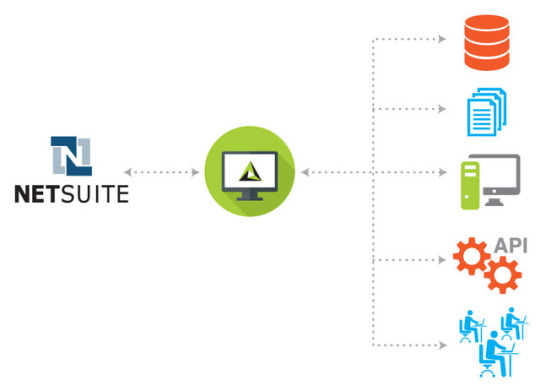
Magento 2 and Netsuite incorporation
These days, organizations acknowledge that it is so vital to stay aware of their information among stages. Physically endeavoring to do this from one stage to the next is near unimaginable. What's more, if your organization is developing, at that point you should as of now be comfortable with the fact that it is so muddled to monitor the accumulation of data.
For example, the Enterprise Resource Planning framework or another kind of outsider framework can be coordinated into the Magento stage. This takes into consideration the streamlining and going of information between key business frameworks, prompting business productivity and expanded benefits.
It's sufficiently hard that combinations are multifaceted to work with, however the test turns out to be considerably more noteworthy when your task is fizzling a direct result of your required information not being shown on the front in of the site. In this way, netsuite magento 2 integration coordination will give your endeavor asset arranging (ERP) stage the ability so required.
Magento 2 gives the capacity to deal with tasks from a solitary center point which produces managerial straightforwardness and productivity. In addition, from a solitary source, clients, requests, and items can be found and changed when vital. With adaptability and versatility, organizations would now be able to modify their on location stores as wanted.
Read more Magento 2 Connector for NetSuite
#netsuite magento 2#Magento 2 Connector for NetSuite#netsuite magento 2 integration#netsuite#netsuite magento
6 notes
·
View notes
Photo
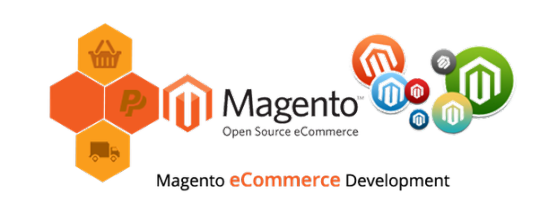
Magento 2 Connector for NetSuite
Our solution provide a real time connector between Netsuite and Magento via API. All sales order data, customer data and Inventory stock stay up to date with minimum monitoring from admin.
#netsuite magento 2#Magento 2 Connector for NetSuite#netsuite magento 2 integration#magento 2 netsuite api
2 notes
·
View notes